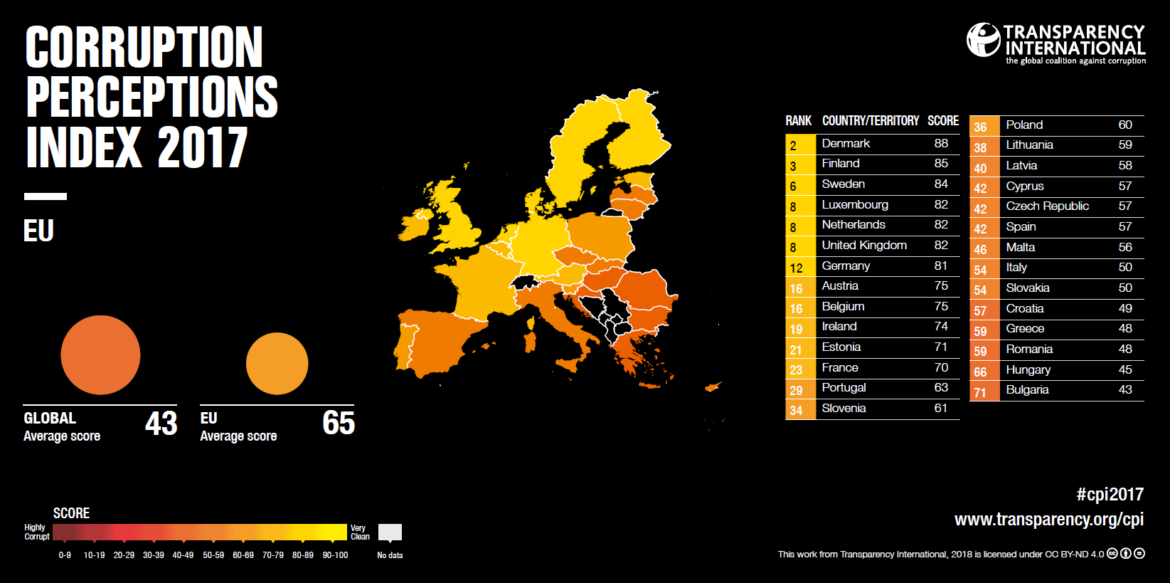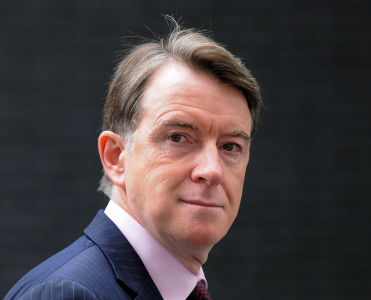Today, Transparency International’s annual Corruption Perceptions Index paints a bleak picture for those European countries which are backsliding on the rule of law, and is a stark warning for the European Union. The results show Hungary has fallen by 10 points over the last six years, which has coincided with the tightening of Prime Minister Viktor Orban’s grip on the country’s state institutions and a clamp down on civil society.
Hungary now ranks lower than Montenegro, a country that the European Commission recently described as showing elements of “state capture… and corruption at all levels of government and administration”, which is one of the main obstacles to its EU membership aspirations.
Over the last six years, there have been numerous allegations in Hungary that members of the ruling Fidesz party and their close associates have been misusing public funds, much of which come from EU-funded projects. This takes place alongside efforts by the government to shut down the activities of independent voices in civil society and academia, such as the Central European University. The government has recently proposed that NGOS they have branded as ‘foreign-funded’ should lose their non-profit status[I].
Similar moves by the government in Poland are currently taking place and should serve as warning to Brussels. The EU must take heed of these results and ensure that the rule of law is upheld in all EU member states, that judiciaries are free and independent and that journalists and civil society can hold power to account.
“Where the rule of law has been severely eroded in Hungary and other Member States, the result has been a flood of state-sponsored corruption,” said Carl Dolan, Director of Transparency International EU. “Poland may soon be swept along in the same direction, with worrisome moves to curb the independence of the judiciary, space for civil society and freedom of the press,” Dolan continued.
In the next eighteen months, as part of discussions on the next budget post-2020, the EU has the opportunity to ensure that the funds it distributes to Member States come with strict conditions to uphold the rule of law, as Transparency International has previously argued[II]. EU money must not be used to bank roll governments that reject EU values of democracy, equality and the rule of law, according to the anti-corruption group.
“The last six years have demonstrated how few cards the EU has to play when Member States challenge fundamental EU values. Concrete action to promote the rule of law and preventing corruption needs to be at the heart of the next generation of EU funding and policies,” concluded Dolan.
Transparency International’s Corruption Perceptions Index is the world’s leading annual global ranking of perceived public sector corruption. Results for the rest of Europe show little improvement in the fight against corruption and formally top performers such as Finland and Sweden have slipped in rank. For the full results and more information please visit: www.transparency.org/research/cpi

NOTES:
- [I] On 18 January 2018, the Hungarian government launched the ‘Stop Soros’ package, a proposal of three laws that target civil society organisations. These laws follow up on the 2017 NGO Law on foreign-funded organisations (Act LXXVI of 2017) over which the European Commission has decided to refer Hungary to the EU Court of Justice. The 2017 NGO Law requires that NGOs receiving foreign funding over €24,000 register on a separate list, report and publicly label themselves as ‘foreign-funded’ or face sanctions.
- [II] Transparency International EU and the Centre for European Reform have published a policy paper which discusses the possibility of attaching rule of law conditions to EU funds in the Multiannual Financial Framework (MFF) in the period 2020-2026. That paper proposes a periodic assessment of the threat to the rule of law in all Member States, which would then be the basis for further in-depth monitoring, suspension or direct management of funds, or rewards for positive performance.




